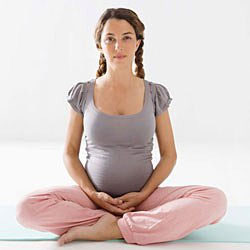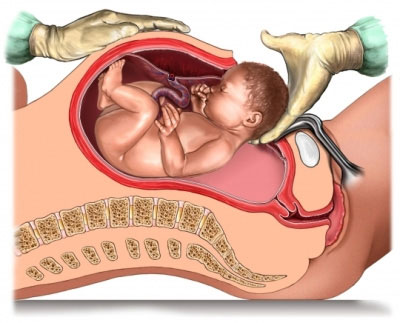Labour is indeed hard, painful work. However, there are multiple things that you can do to make the experience a better one. Here are a few non-medical options that should help calm you down and reduce labour pain. In this articleHospitalNightclothesPositionBathroomGheeFluidsWalkEnergyHospital Which hospital will you be delivering the baby at? Go with the advice of your gynaecologist. If your gynaecologist works at or suggests more than one hospital or nursing home, you may need to make the decision yourself. Speak to friends and families who have delivered at various places, and get their opinion. However, dont make the final decision without visiting the hospitals or nursing homes yourself. Once you have made a decision, visit the hospital again to take a good look at the room and bathroom. Familiarising yourself with the place you will be giving birth removes some of the stress associated with the unknown. Take a look at where the room is, how far is it from the delivery room etc. Nightclothes You may feel more comfortable in your own nightclothes than in a hospital gown. Speak to your gynaecologist beforehand to find out if this is permissible. Position What position will you be in when pushing? Many doctors will have you lying down on your back, with your knees propped up and pushing. This position however doesnt receive any help from gravity. You may want to be in a crouching or squatting position when pushing. It is easier to push down, than it is to push forwards. Also, avoid pushing between contractions. Give your muscles a chance to stretch slowly. This may help avoid an episiotomy. Bathroom Urinate frequently. What happens sometimes is mothers may notice a sudden urgent need to urinate when pushing. As a result, they dont push as hard as they should. Empty your bladder every hour. You may find the need to pass stools more frequently as well. Your bowels are cleaning up in preparation for labour, so do visit the bathroom as often as necessary. Taking a shower or a warm bath may help ease the pain. Ghee Some swear that drinking a small cup full of ghee helps with the delivery. There seems to be no scientific basis to this, and the only evidence supporting this theory is peoples experiences. One cup of ghee when going in for delivery will not hurt, so if you want to give it a shot, go ahead. Fluids Drink plenty of fluids during your pregnancy and during labour. Your body requires more fluids when you are pregnant to prevent constipation and dehydration. There is also increased pressure on your kidneys as your baby grows, and drinking more water keeps your kidneys functioning well. Dehydration can also cause premature labour, so drink up. Walk As far as possible, try to walk between contractions. Walking may not be easy depending on the stage of labour you are in, and you will need more and more support as your labour progresses. In addition, it encourages steady contractions. It also keeps your pelvis floor moving, and helps position the baby for delivery. Discuss all this with your gynaecologist. Energy You may feel a sudden burst of energy a day or two before going into labour. This is natures way of preparing you for the hard work you will have to do, so be careful not to use up all this energy! Dont overexert yourself and spend the entire day running around the mall, just because you feel so energised. Save some of that energy - you will need it.
Labour is indeed hard, painful work. However, there are multiple things that you can do to make the experience a better one. Here are a few non-medical options that should help calm you down and reduce labour pain.
Hospital
Which hospital will you be delivering the baby at? Go with the advice of your gynaecologist. If your gynaecologist works at or suggests more than one hospital or nursing home, you may need to make the decision yourself.
Speak to friends and families who have delivered at various places, and get their opinion. However, don't make the final decision without visiting the hospitals or nursing homes yourself.
Once you have made a decision, visit the hospital again to take a good look at the room and bathroom. Familiarising yourself with the place you will be giving birth removes some of the stress associated with the unknown. Take a look at where the room is, how far is it from the delivery room etc.
Nightclothes
You may feel more comfortable in your own nightclothes than in a hospital gown. Speak to your gynaecologist beforehand to find out if this is permissible.
Position
What position will you be in when pushing? Many doctors will have you lying down on your back, with your knees propped up and pushing. This position however doesn't receive any help from gravity. You may want to be in a crouching or squatting position when pushing. It is easier to push down, than it is to push forwards. Also, avoid pushing between contractions. Give your muscles a chance to stretch slowly. This may help avoid an episiotomy.
Bathroom
Urinate frequently. What happens sometimes is mothers may notice a sudden urgent need to urinate when pushing. As a result, they don't push as hard as they should. Empty your bladder every hour. You may find the need to pass stools more frequently as well. Your bowels are cleaning up in preparation for labour, so do visit the bathroom as often as necessary. Taking a shower or a warm bath may help ease the pain.
Ghee
Some swear that drinking a small cup full of ghee helps with the delivery. There seems to be no scientific basis to this, and the only evidence supporting this theory is people's experiences. One cup of ghee when going in for delivery will not hurt, so if you want to give it a shot, go ahead.
Fluids
Drink plenty of fluids during your pregnancy and during labour. Your body requires more fluids when you are pregnant to prevent constipation and dehydration. There is also increased pressure on your kidneys as your baby grows, and drinking more water keeps your kidneys functioning well. Dehydration can also cause premature labour, so drink up.
Walk
As far as possible, try to walk between contractions. Walking may not be easy depending on the stage of labour you are in, and you will need more and more support as your labour progresses. In addition, it encourages steady contractions. It also keeps your pelvis floor moving, and helps position the baby for delivery. Discuss all this with your gynaecologist.
Energy
You may feel a sudden burst of energy a day or two before going into labour. This is nature's way of preparing you for the hard work you will have to do, so be careful not to use up all this energy! Don't overexert yourself and spend the entire day running around the mall, just because you feel so energised. Save some of that energy - you will need it.































